Is the Scottish education sector ready to support the digital transformation of health and social care?
A Digital Health & Care Innovation Centre (DHI) provocation piece for the Royal Society of Edinburgh
The COVID-19 pandemic has accelerated the digital transformation of health and care services in Scotland and across the world. To maintain this much needed momentum, consideration needs to be given NOW to skills development for current and future employees, if Scotland is to deliver better citizen outcomes, drive efficiencies, support economic growth and attract our share of Research & Development investment.
There are three main categories of staff who are affected by digital transformation in health and social care:
- The entire frontline health and social care workforce, who directly use digital services and solutions to support the day-to-day delivery of care.
- Technical professionals, who design, develop, deliver, and implement digital solutions for use by health and social care, and who enable and accelerate the basic digitalisation of these sectors.
- Specialist digital, knowledge, information and data professionals in health and social care who capture, organise, analyse, and manage information and data to support and improve service delivery.
Evidence suggests there is a significant gap between current educational provision and the needs of the health and care sector (see Morrison et al., 2021). Health Education England’s Digital Readiness programme (2020) projects a 69% increase in demand for digital and data specialists as part of the NHS in England. The demand for clinical informatics specialists is predicted to increase by 672% by 2030, by 325% for specialists in IT strategy and development, and by 179% for Knowledge Management specialists in the same category. Similar trends are anticipated to apply in Scotland.
In addition, ScotlandIS advises 75% of technology companies are currently struggling to recruit qualified digital staff. “This coincides with a 31% reduction in computing education generally and a high drop-out rate of computer science undergraduates. ScotlandIS also reports that Scotland has approximately 13,000 new digital job opportunities annually, but there are only 5,000 home-grown graduates and apprenticeships being produced by HE and FE now.“ (Morrison et al., 2021, p 5.)
There are already concerns about whether the education sector is geared to meet the broader digital - and data - skills needs of the frontline health and care staff. Are our Educators ready to prepare students for these new employment opportunities and ways of working?
Education landscape review
In early autumn 2021, the DHI carried out a comprehensive landscape review of the education provision in Scotland that has the potential to support the digital transformation of health and care[1]. This study reviewed the prospectuses of 16 universities and 27 colleges, and included topic-relevant degrees and short-courses in the following subjects:
- ICT, computing and relevant STEM;
- health and medicine; courses in digital health;
- social care;
- relevant design courses;
- relevant business, management and leadership courses; courses in innovation and entrepreneurship.
As the digital transformation of health and care requires an interdisciplinary effort, we included a diverse range of subjects from across the spectrum within the review. Out of all available undergraduate and postgraduate degrees and short courses across HE and FE, the review included[2] 566 courses in computing and relevant STEM; 495 in health or medicine; 173 in social care; 143 in relevant design and 263 in business, management, or leadership.
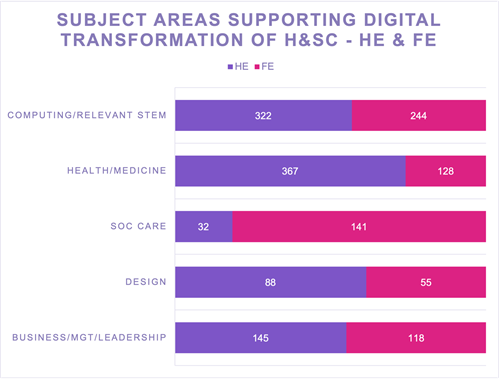
Health, medicine and social care
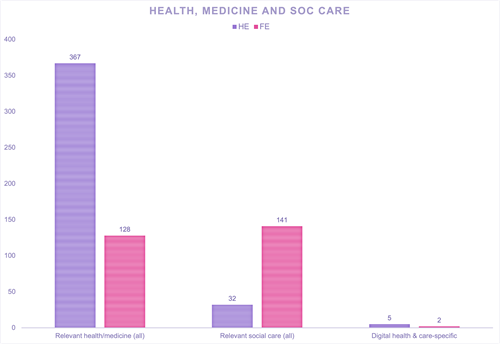
The study showed a clear division of labour between HE and FE in providing education for healthcare and social care staff, with universities tending to educate medical staff and the bulk of healthcare staff, while colleges appear to be the predominant provider of education for social care staff.
Being able to deliver care in a digitally enabled environment requires digital skills and data literacies from all staff. However, searching for “digital” in the course content for health, medical and social care staff in both FE and HE generally brought very little up for either sector. In terms of digital health and care specific courses, there are five Master’s level courses in HE and two CPD modules available in FE.
ICT, computing and relevant STEM
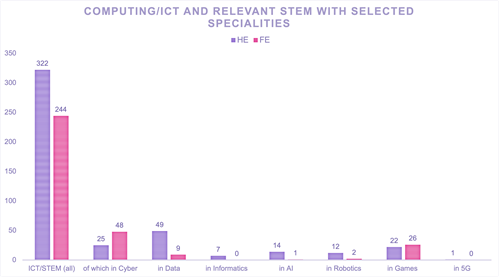
ICT, computing and relevant STEM are crucial to digitalisation of health and care services, as these subjects supply a vital pipeline of talent for the development and running of the digital infrastructure and devices supporting the delivery of health and care. However, the exposure of students in these subjects to health or care is meagre, with the exception of informatics where three out of the seven available courses relate to health or medicine, and in data analytics/science, where four options are health specific.

Business, management and leadership
The role of leadership is recognised as vital for the successful transformation of services. There appears to be a good provision of business, leadership and management courses in Scotland, both at HE and FE.
Education in entrepreneurship and innovation are also important for creating a pipeline of businesses that will further expand the Scottish digital health and care tech industry. The emphasis of this provision is at universities, mostly as part of their PG provision.
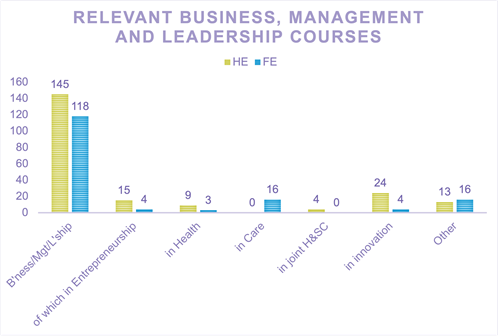
Design
The role of design is crucial for successfully transforming health and care services. Design approaches can be applied to all aspects of digital transformation journey, from bringing in patients and other stakeholders to envision improved or future services, environments, health and social care solutions and devices, etc. Across the provision, there was only one Design course dedicated to healthcare specifically.
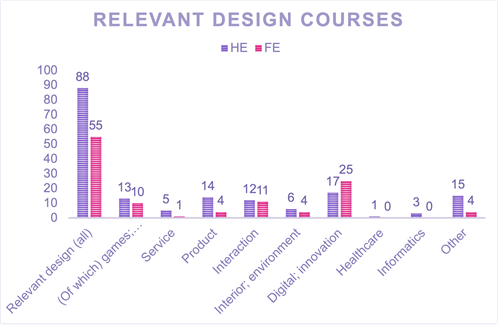
What does the landscape review tell us?
The DHI review considered whether the content of what is currently being taught is sufficient to support the digital transformation of health and social care. It shows that while training to meet future medical, health and social care needs in Scotland is widely available, students are still on the whole, being trained to work in a non-digital world. Current course content is also not being linked up appropriately, e.g., with a view on how cyber security needs to be applied within the health and care context or how business management skills are required for digital services. This imbalance will not adequately prepare students to contribute effectively to an increasingly digitally enabled health and care environment.
The Scottish education landscape has all the right ingredients to support a thriving digitally enabled health and care sector in Scotland. However, these ingredients need to be refreshed and blended effectively - the curricula need to be digitally future-proofed and appropriately connected to enable us to move forward at pace and create high level jobs and opportunities for Scotland.
Dr Sanna Rimpiläinen
Nov 2021
[1] NB: This review should be regarded as an illustration of the education landscape, as the course provision in the institutions keeps changing and different institutions have different ways of displaying their available courses.
[2] Exclusions:
- Any courses that were on a very low level (most access courses, SWAP, ESOL courses, courses offered to schools) with the exception of access courses leading to cyber security, data or digital, and apprenticeship courses.
- Early Education and childhood-related courses (because these were often presented in a different category).
- Any duplication in provision in terms of the same course being offered pt/ft, on a different campus, during a different term or in a different delivery mode (online, f2f).
- Any design courses that had no digital element to them.
Please, note:
- In most colleges health and social care are delivered as joint courses now. These have been classified based on which name comes first in the title of the course: health or care.






